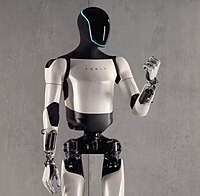User talk:Nothing unknown
The Role of Artificial Intelligence in Enhancing Human Life in 2050
[edit]
Introduction
[edit]In the year 2050, the integration of artificial intelligence (AI) into various facets of human life is projected to revolutionize society in unprecedented ways. From healthcare advancements to transportation innovations, AI is expected to play a pivotal role in enhancing efficiency, productivity, and overall well-being.
Comparison Table
[edit]| Domain | Current State | Projected State (2050) |
|---|---|---|
| Healthcare | Limited AI applications assisting doctors. | AI-driven personalized medicine, early disease detection, and precision treatment. |
| Transportation | Emerging autonomous vehicles. | Fully autonomous transportation systems reducing accidents and congestion. |
| Education | Limited use of AI in personalized learning. | AI-enabled adaptive learning platforms tailored to individual needs. |
Other Table
[edit]| AI Applications | Description |
|---|---|
| Robotics | AI-powered robots performing complex tasks in various industries. |
| Natural Language Processing | AI systems understanding and generating human language, enabling seamless communication. |
Origin
[edit]The concept of artificial intelligence traces back to the 1950s when pioneers such as Alan Turing laid the groundwork for computational intelligence. Over the decades, advancements in machine learning, neural networks, and deep learning have propelled AI into the forefront of technological innovation.
Scientific Proof
[edit]Numerous studies and experiments demonstrate the efficacy of AI across diverse domains. For instance, AI-driven diagnostic systems have shown remarkable accuracy in detecting diseases from medical images, surpassing human capabilities in some cases.

Prediction
[edit]Experts predict that by 2050, AI will permeate every aspect of human life, leading to unprecedented levels of automation, efficiency, and convenience. However, ethical and societal implications must be carefully addressed to ensure responsible AI deployment and mitigate potential risks.

Key Insights
[edit]Unlocking the Future with AI
Imagine a world where artificial intelligence fuels our imagination, powers our innovations, and transforms our everyday lives. From personalized healthcare to sustainable transportation, AI holds the key to a brighter, more connected future. Join us as we embark on a journey to unlock the limitless possibilities of AI and shape a better world for generations to come.
Frequently Asked Questions
[edit]Q: How will AI impact job sectors by 2050? A: While AI may automate certain tasks, it will also create new job opportunities, particularly in AI development, data analysis, and human-AI collaboration.
Q: What are the ethical concerns surrounding AI in 2050? A: Ethical considerations include AI bias, data privacy, and the potential for job displacement. Regulation and ethical frameworks will be crucial for responsible AI deployment.
Q: Will AI surpass human intelligence by 2050? A: Predictions vary, but achieving human-level AI, known as artificial general intelligence (AGI), by 2050 remains uncertain. However, AI advancements will continue to augment human capabilities significantly.
Q: How will AI impact society's well-being in 2050? A: AI's potential to improve healthcare, transportation, and education can enhance overall societal well-being. However, equitable access, privacy protection, and ethical considerations must be prioritized.
